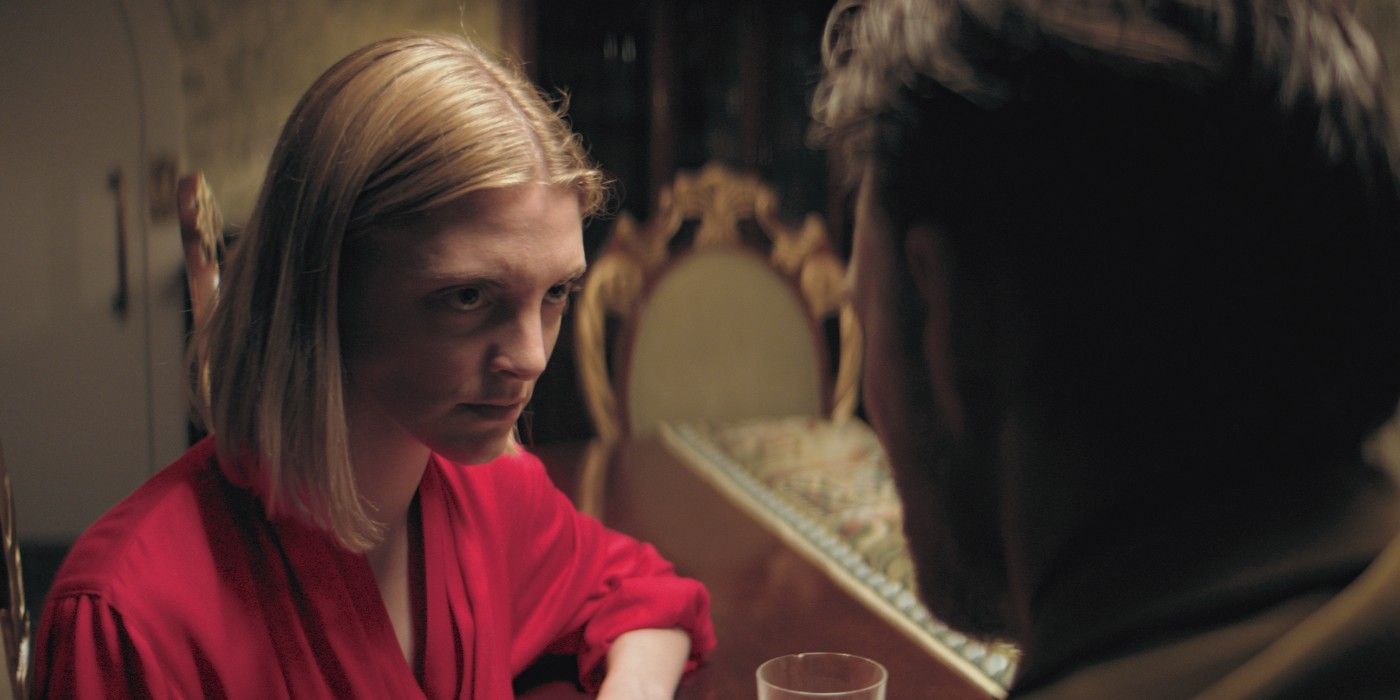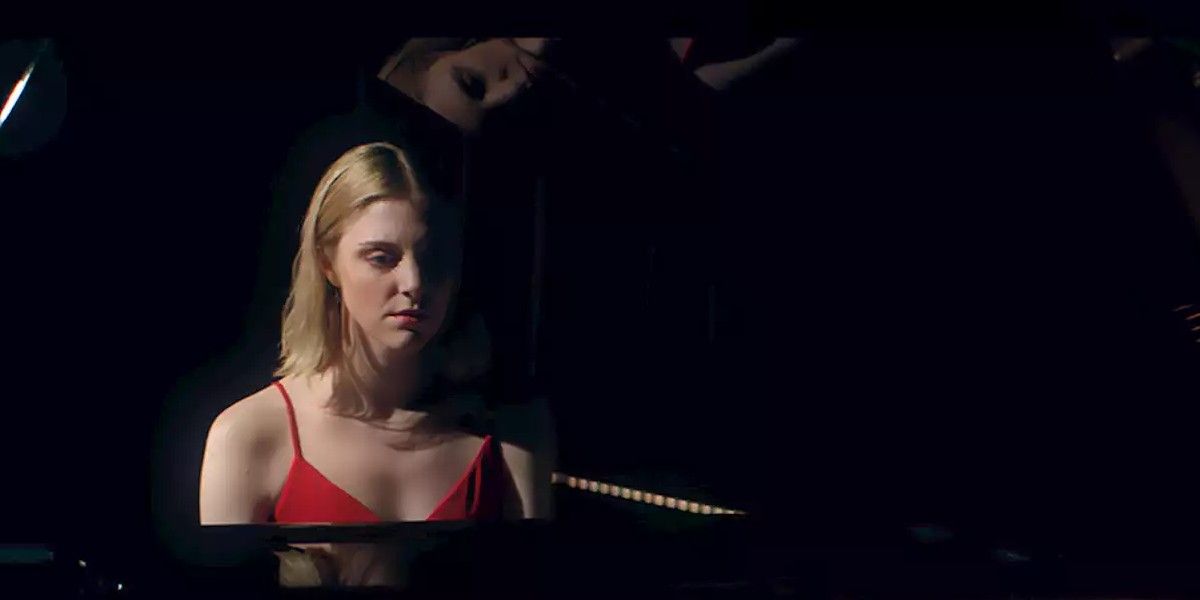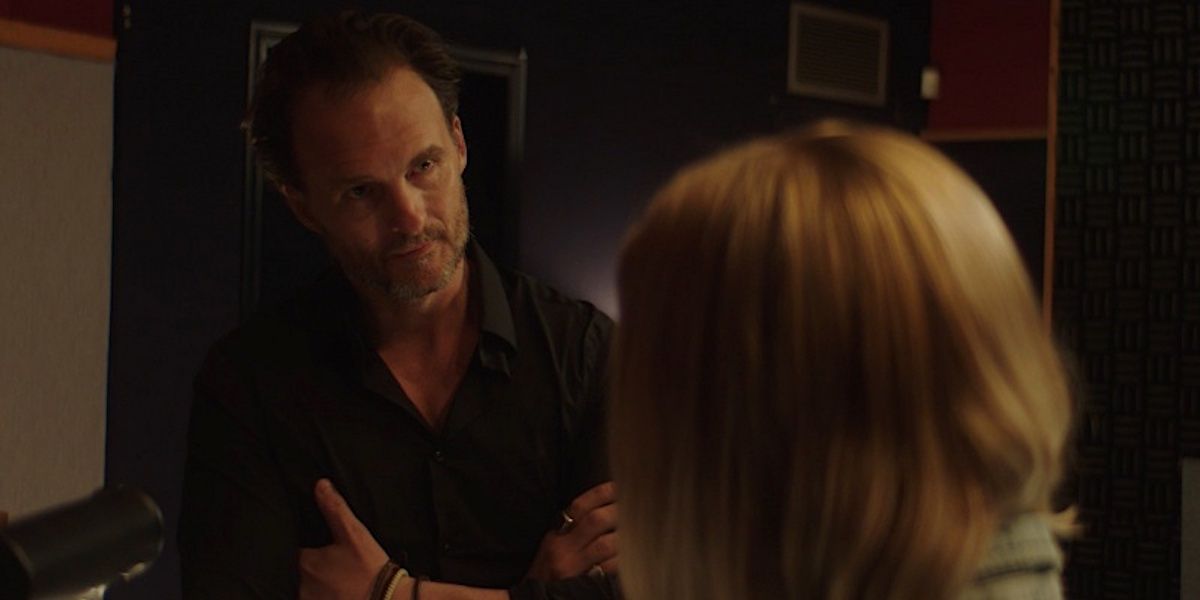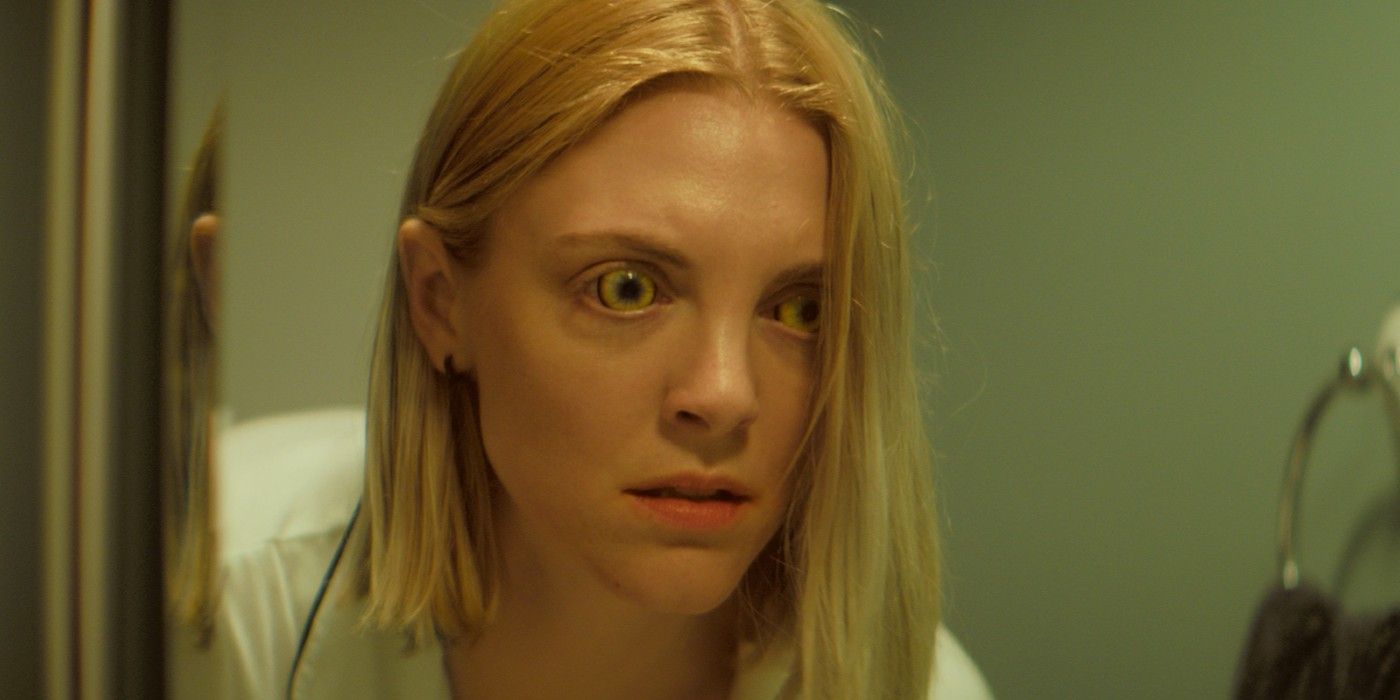
WARNING: The following contains spoilers for Bloodthirsty, which is currently available in select theaters and on demand.
In Bloodthirsty, singer-songwriter Grey arrives at reclusive producer Vaughn's secluded home in the hopes that he can help her conquer her writer's block so she can create a successful second album. But as Vaughn pushes Grey artistically, he also encourages her to give in to her animal instincts, leading her to embrace a new, more monstrous version of herself. Bringing Grey and Vaughn to life are Lauren Beatty and Grey Bryk, respectively, who together create a complex onscreen dynamic that is creative, disturbing and, in the end, shockingly violent.
Beatty and Bryk spoke to CBR about creating their characters' relationship for Bloodthirsty, the compromises and challenges of the artistic process and the fun of donning werewolf makeup.
CBR: How did you both get involved in Bloodthirsty?
Lauren Beatty: So I had worked exactly a year prior with Amelia Moses, our director, on another film that she directed called Bleed With Me. And she came on to this project pretty late and reached out to me because, obviously, the main character's [a] queer singer-songwriter and [she] knew that I'm both those things in real life, so she approached me with it. And it was really just a no-brainer for me to take this role because it's ultimately a dream role for me. [Laughs.] We'd already had a nice relationship, and I loved working with her.
Greg Bryk: And I was shooting a movie that Wendy [Hill-Tout], who co-wrote it with her daughter [Lowell], was directing and that [Michael Peterson] was producing, who was a producer on this, and they approached me and asked if I was interested in being a part of it. And I am old and creepy and partially a werewolf in real life as well, so it seemed a natural fit for me to just jump right on. [Laughs.]
But I thought the script was interesting. And I had played a werewolf on a series [called Bitten] a few years ago. And I think there's something almost more honest in fantasy because it taps into archetypes. Beneath the social mask, there's something happening and Grey's struggle in this as an artist, the idea of what you have to do to be great appeals to me as an idea. I struggle with -- as a Canadian we're so polite and so nice -- and I often wonder if that gets in the way of being exceptional. And I've seen enough of the world to know that sometimes, you've got to be a bit of a bastard to make things go. Well, it's true. Right Lauren?
Beatty: Yeah.
Bryk: And this is kind of coming to grips with that. How do you walk that line? And how do you be authentic? And how do you be true to yourself and manage that? So how do you have the beast and keep it on a leash, I guess?
Beatty: [Laughs.] I like that metaphor.
Bryk: I should tweet that.
Beatty: Yeah, you should tweet that immediately. [Laughs.]

It's a werewolf movie, but it's also about the fundamental drive of the creative process. As creative people, was that something that you inherently understood?
Beatty: Yeah, yeah. It was definitely something I fully understood. I've had experiences in the past where I've dealt with writer's block or I've dealt with -- imposter syndrome's a big one. And it's trying to silence those monsters within you to get past that. But I mean, ultimately, in this film, she just becomes the monster. She becomes this representation of everything that was getting in her way, and ultimately sacrifices everything to become a great artist.
So I think it begs that question of how far are you willing to go for your art? How far is too far? How far is just far enough? Who's the judge of that? I mean, I think ultimately, we as individuals are. But it was very cathartic to do this film because I could see myself mirrored in Grey constantly.
What about you, Greg? As an actor did you latch onto that?
Bryk: Yeah, I mean, the idea of taking your space is something that I've spent a good part of my life thinking about. The tension between trying to be a good person and a nice person and get it right and just being selfish in a creative way. And I think the older I get, the more willing I am to take what I need to take to make the work work. But you try to be a good person around that.
Because at the end of the day, they don't watch a movie with the director's commentary going, "But he's so nice and he was just so accommodating all the time." They don't care. People want to see something that moves them or startles them or surprises them. And I think that as people and as actors, it is finding a balance because you see and you hear stories of just monstrous behavior where people are abusive and it's toxic and that doesn't help a set. But then there's also times where you let the noise around you and trying to accommodate everybody else take away from what you need to do, which is when the set goes quiet and the director yells, "Action." You have to reveal yourself honestly, and that's not an easy thing to do. So it's finding that and what sacrifices do you have to make to get close to great. And sometimes you have to give some things up.

Lauren, you also had to interpret and bring the songs for the film to life as Grey. How did you approach that particular challenge?
Beatty: Well, I didn't have much time, I will tell you that much. I found out I got the part and then I think it was within five days, I had to leave to start shooting. So Lowell had sent me all of the songs that would be in the film. I had to learn [the song] "Bloodthirsty" for the audition, so I already knew that one. But I had to learn piano in those five days, so just the chords that you actually see Grey playing, but that was interesting. It was kind of in a way, I guess, what Gray is going through. It's like I was kind of just thrust into this thing, right? And I had to just start right away and whatever insecurities I had about it, whatever impostor syndrome I had about it, I just had to drop it and just go. And I think there's probably a bit of a lesson there, too, but it was really, really fun for me to [do the] music.
Bryk: You were awesome!
Beatty: Thank you! [Laughs.]
Bryk: I'm telling you that was my favorite part of this whole movie was listening to her sing. Yeah, I mean, I like that. There's something about the human voice singing that's just, to me, so pure. I like acting obviously a lot, but if I could be anything, I would want to be a singer. And to listen to her was just -- I don't know, it just gets to a really pure place. And that was, to me, to be able to sit there, that was my favorite part of the whole shoot was just watching you go there and make that song come to life through you. That was just beautiful.
Beatty: Thanks, Greg. I pay him to say that.
I really felt a strong connection to the songs and I hope that that came across in the film. Lowell is a really amazing writer and her lyricism is amazing, and so it was pretty easy for me to really get into these songs and really, really feel them. But it was, for me too, when I first heard the music is when I was just 100 percent, without a doubt sold on this film because I could already picture what the entire movie was, just hearing those songs. So it's pretty special. I feel pretty lucky.

It's also really interesting because your characters have this really creatively fruitful but difficult relationship. What was it like for the two of you to create that around this music?
Beatty: It was so easy to work with Greg because he's such a professional and so good at what he does. And it was so funny to me because, as you can tell, Greg's a bit of a jokester, I'm a bit of a jokester, so we have this really funny kind of jokey relationship. But then as soon as the cameras would roll, he'd just go right into it, and I'd be like, "Ah!" It's almost startling. But I guess I did the same thing, too. But yeah, he's just such a professional, and he's good at playing that role of the kind of overpowering you kind of guy, and it was nice to know that he's a joker in real life because I think if he was also like that in real life, I might have been a bit intimidated. He just brought a lot to Vaughn, so it made my job a lot easier as well.
Bryk: What I found super interesting, and I find this a lot, is that you have something written, right -- it's on the page and this relationship is written -- but then when you meet the person and you start to play together and spend time together, so much more comes to it. I think that there was almost a vulnerability that I started to feel towards you because the music affected me in a way, and I don't know, it touched my heart genuinely in a way, and just our friendship that developed, that there was almost a sweetness or a vulnerability underneath it all that I don't necessarily think is in the dynamic [in the script] but it makes it more interesting because it's kind of -- I don't want to say parent-child because that's whatever -- but you have that.
And those are the things I like so much, is that you have sort of a series of words that are a character, but then the heart gets involved and people meet and there's other things about them that can't help but become part of the world of the film. It just makes things much more complicated and rich and interesting because it's not straight-line characters. There's a lot of shades, a lot of bruises, a lot of bits of gray in there.
Beatty: Bits of Grey -- good one. [Laughs.]
There is, of course, a big werewolf part to the story. What were the challenges of that?
Beatty: It was very, very fun for me. Like I said, it was very cathartic to sort of work through those same issues that Grey works through and sort of see the physical manifestation of these monsters that are inside of her. The practical effects were super, super helpful I think, because if you were doing all of this in post [production], you're kind of just hoping that your acting is going to match whatever they end up painting you as. So for me, it was very helpful as an actor to be able to just look down at my hands or look at my reflection in my phone and be like, "Okay, that's what I look like," and just get right back into it.
Bryk: And it's partly the sense of play about it too -- you become a werewolf. And I know that the CGI and stuff is really great, and I'm not going to [insult technology] -- yay for technology. But I think the fact that there's something human and built by other humans onto it, there's magic to that and there's a weight to it, because underneath all of that is the human heart beating. And it's not a very clever trick of light and movement on screen, it's someone real and you're feeling that on yourself.
It was thrilling to put that makeup on and just be in it because if you were a werewolf, you would look in the mirror and you'd be like, "God, who's this wolf over here?" I just think there's something -- if you think of those old Star Wars movies with the models, it actually occupies three-dimensional space -- and there's something that I think the human brain recognizes, "Oh, that's real." Obviously, it's not real, but it's real as opposed to this is just a computer trick.
God, I'm so anti-computer now. I'm a real Luddite in my lockdown. I'm a lockdown Luddite.
Beatty: I'm going to throw mine out after this. [Laughs.]
Bloodthirsty, directed by Amelia Moses and starring Lauren Beatty, Greg Bryk, Katharine King So, Judith Buchan and Michael Ironside, is available now in Canada through Raver Banner Releasing and in America in select theaters and on demand.
0 Comments